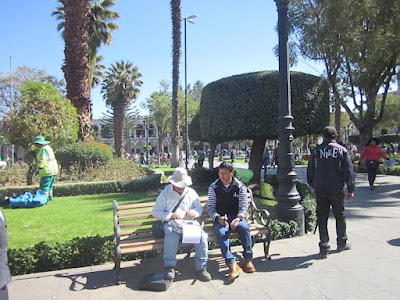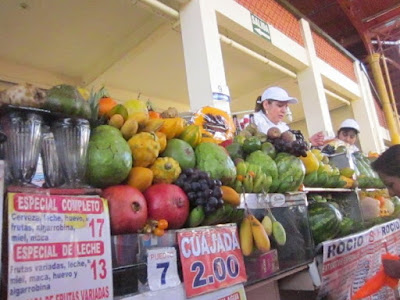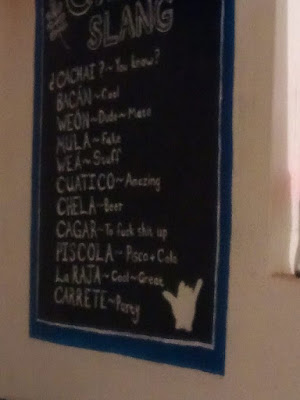Near the central park, I noticed several tour booths that offered horseback excursions. Forrest wasn’t interested and besides, he still had a week of Spanish school left. I found the prices quite cheap for what it would cost in the States for a comparable experience.
Everywhere I checked, they said, “Hoy?”
No, hoy no.
“Manana?”
I scheduled my ride for manana from one to four, a three-hour ride through the countryside on the outskirts of Arequipa. A driver would pick me up at my hotel at 12:30.
Not sure how to dress or what to take, I ended up with a water bottle and a light jacket in my backpack. At the office when I signed up, they told me to bring a hat. I decided against my hat, since it didn’t work with my hair in a ponytail, and I was concerned about it flying off during the ride. I wore leggings, my Doc Marten boots, and a long-sleeved t shirt with a flannel over it. This had become my standard comfort outfit for Chile and Peru, ready for either a cool day or a hot one or often both in the same day.
The car that picked me up drove to a farm outside of town. I thought it was a taxi, but no, the driver was from the farm. His brother would be my guide, he told me. Apparently, it was a family farm and they all lived there. I assumed this ride was paid by my fees, so I had not brought any money for anything, although I felt cheap not tipping the driver.
The guide when I met him was a friendly, talkative fellow. While getting the horses ready, he asked me about myself and said he had recently returned from living in Germany for several years.
The guide helped me mount. The stirrups were awful for me, so narrow and small. I couldn’t get my boots in them comfortably and as a result, did not feel like my legs were positioned correctly. I was afraid if I didn’t get my feet and legs situated, I'd fall off this tiny saddle. Finally, I managed to find some level of workability and say, “Okay, I’m ready.”
The guide looked so relaxed and at ease on his horse, I wondered where I had gone wrong. I hoped with time I could settle into it better. Unfortunately, I was disappointed in that hope.
I wasn’t sure if it was the saddle or the stirrups causing me problems. I expected it was the stirrups that needed adjusting for my legs. The guide did none of that. He had helped me up and then mounted his own horse while keeping a running monologue about his time in Germany. I’d have appreciated more attention to make sure I fit comfortably in this saddle instead of a travelogue.
We headed out the gates of the farm and faced the next stressful encounter of the day-- crossing a busy street with cars rushing by at sixty miles an hour. On our horses. A horse I did not know and hoped I could control.
Holy crap. What had I gotten myself into?
At a break in the traffic, the guide headed across and I quickly urged my horse right after. Thankfully, my horse followed right behind his friend. Then we were on a dusty country road. When a car approached, which it rarely did on this road, we moved to the edge as it passed.
The guide explained things along the way, such as what crops grew in the fields. He said he had changed our route due to protests. They were over water rights of the farmers versus the corporate mine owners, he explained. That explained the protests and signs I had seen going on around the central park. Peaceful marchers carried banners printed with Farmers yes, Miners no.
Packs of dogs often came out of nowhere and chased after our horses. The guide yelled at them, Fuera! All dogs understand the word fuera, he said. If you yell “fuera” to any dog, it goes away. I wondered if it would work for American dogs.
About two hours into our ride, he asked if I was ready to go back. Yes, I replied. I felt quite sore. My legs, still in that awkward position, were the worst. This was the only time in my life where I felt a horseback ride was too long. Normally, it’s the opposite, where they always turn back before you’re ready.
He seemed confused over direction. A few times he stopped and asked someone along the road about our location.
We apparently were headed the right way, because eventually he said, “It won’t be long now. Do you want to go fast?”
Sure, anything to get this over with. Then we galloped for awhile to make better time.
Another two hours went by. NOTE - we're now on HOUR FOUR of what is supposed to be a three-hour ride, and still out somewhere in the country.
At long last, we faced the highway again. Good, because that meant we were nearly to the farm. Bad, because it was five pm and traffic was worse.
We waited and waited, until finally at a slight break he said, “Let’s go!” And galloped across the road.
I had no choice but to follow, thinking I’m going to die. I’m going to get this horse and myself hit by a car and killed. But I made it, although I think my brain blacked out for a second racing across the street.
Back at the farm, I could not wait to get off this horse. I had never ridden four straight hours in my life. And this while fitting awkwardly in the stirrups and the saddle.
The guide helped me off. My legs were wobbly and too weak to hold me up. Besides that, I felt a wave of nausea and dizziness where I nearly passed out. He said it was the altitude and led me over to the hay bales. "Rest here. And don’t worry," he said, "I’ll take care of your horse."
The horse was the least of my worries. After all this, did he mean to say I was responsible for removing the saddle and patting down the horse and leading it back to the corral? If so then I’m glad I almost fell over, because no way could I have managed that.
I felt suddenly chilled and pulled the jacket out of my backpack. I emptied my water bottle, wishing I had more. I curled up on top of the hay bale and closed my eyes and lost track of time.
It seemed like the guide was gone with the horses for a very long time. It was getting dark. I longed to return to the hotel and go to bed. I hoped Forrest was there. Getting locked out would not be a happy ending. There was only one set of room keys that we shared, and I had left them for him.
Finally, the guide returned. He asked if I’d like to come inside and stay for dinner and wait until I felt better.
"No, thank you. I'm ready to get back. I'm fine now."
His brother was not there and so he was the one who drove me back. He drove slowly and talked about Germany and what he did there until finally we reached the welcome destination of Estancia 107.
I thanked him for everything and wobbled into the hotel and on to our room. Forrest was there looking relaxed, comfortable, and peaceful. The opposite of me.
“How was it?” he asked.
“Not that great. Peruvian saddles are a lot smaller than Western ones, and the stirrups are weird. And the guide was strange but oh well, I’m glad I went and I’m glad it’s over.”
I went to shower and put on pajamas. Blood was on my clothes and running down my thighs. Must be from saddle sores, I thought. I had never before gotten saddle sores.
It felt so good to lay down in our peaceful, familiar room at Estancia 107, with my lanky son stretched out on his bed reading an e-book.
In a few days, we had to check out and move to another hotel for our final week in Arequipa. After that, we were off to a month in Cusco. Forrest and I had so enjoyed ourselves here, beginning with our first night carrying on for hours about the Sixty Days and the initial lack of WiFi. Was that only three weeks ago?
This hotel with the odd name that looked like a house had truly become home to us. I would miss it.


























